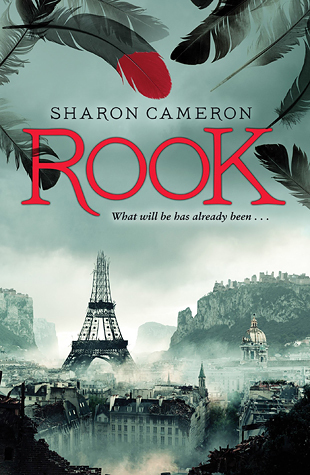 Rook by Sharon Cameron
Rook by Sharon Cameron
My rating: 2.5 stars
In a sentence: Awkward French revolution homage.
Rook has a really interesting premise: a post-apocalyptic world where society in Paris has regressed to resemble the French revolution-era political climate. But the execution (pun fully intended) is awkward and the result is 454 pages that can’t quite decide on the audience, and whether it is a retelling, an homage or a mash-up of unrelated ideas.
The book heavily references works like the Scarlet Pimpernel and the events of the French Revolution, even down to the main antagonist mirroring Robspierre. But I think the vast majority of these nuances would be completely lost on a younger YA audience which the book is targeted at. Overall the book is too simplistic for an adult audience who would appreciate the references. Audiences who are missing the references will probably find this book light on ‘world building’ because the author relies so heavily on prior knowledge to build up the world and indeed the tension of what is to come.
Never has an author’s note been more revealing, with an explanation for my frustrations with this book. If you need to read the author’s note to understand why an offhand comment about magnetic poles is significant to the world-building, and that the question of what people who have regressed would think of falling space junk was key to the development of the novel, then something has got lost in translation.
The author’s note says:
“The novel that became Rook is not so much a retelling [of The Scarlet Pimpernel] as it is an homage, conveniently coupled with all those strange and disparate ideas that I find so intriguing.”
And in reading it the book actually felt like a series of disparate ideas that didn’t quite gel. Like a pet project, or a fan-fiction where lots of different elements have been combined: The French revolution is really interesting, but why not in the future, but regressed because of solar flares destroying technology, and I want the characters from The Scarlet Pimpernel but rewritten to be more progressive, and I like England so the main character should be from there.
Beyond the plot and overall premise, the execution of Rook was also lacking. To me it felt like an editor needed to be far more heavy-handed is curbing the delight Cameron took is using a couple of literary devices over and over again.
Throughout the novel, there is an awkward chopping and changing of perspectives that is frustrating and distracting. I love multiple point-of-view novels, I love having an insight into lots of different characters, but the way it was executed in Rook was poorly done. At some points the perspective sifted multiple times on a single page. Which could have helped create tension and a frenetic pace during action sequences in the book. Unfortunately there was so little ‘action’ in those breaks that I felt myself losing concentration. At some points I had to force myself to pick the book back up after taking a break and wandering around the house every couple of pages.
Most frustrating of all was the little ‘cute’ writing device of having the last visual cue of a section lead into the next, which was is completely overused. Once or twice for effect is enough in a whole novel and I would have applauded it. But it was used so many times I was cringing in expectation at the end of paragraphs waiting to see it used again! By chapter 21 I was so sick of it I started marking the pages where it was used. In that single chapter it was used 15 times.
If you’re not sure what I mean by this here are a few examples:
Ie. Last sentence of a perspective:
‘Quiet, Gerard,’ she ordered. ‘I have to think.’
Followed immediately by a change of perspective which opens with:
‘Quiet,’ said Benoit…
Then barely 5 pages later it happens again:
There were three paths she could take. Left, right, or straight.
Followed immediately by a change in perspective which opens with:
‘Which way, Hasard?’
It just feels painfully contrived and when one perspective has only been held for all of 1 page or even a single paragraph it becomes incredibly frustrating. I understand it is meant to create a frenetic pace, and heighten the tension, but it did the exact opposite and made me want to put the book down every time it happened.
Despite all of these flaws there were some really enjoyable elements to this book. I like the main character and the relationship she had with her brother. I also didn’t mind the budding romance (though I could have done without a reminder that his hair was fire-engine red on every page). The plot was a little slow in places, but developed into a nice conclusion, with the main characters mostly having overcome some challenges and emerged better for it.
I won’t be recommending this book any time soon, but if you have a passion for French Revolutionary history, or count The Scarlet Pimpernel among your favourite books you might very well enjoy it.
